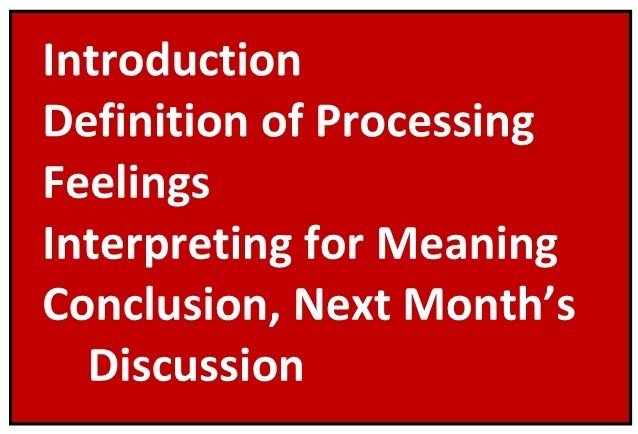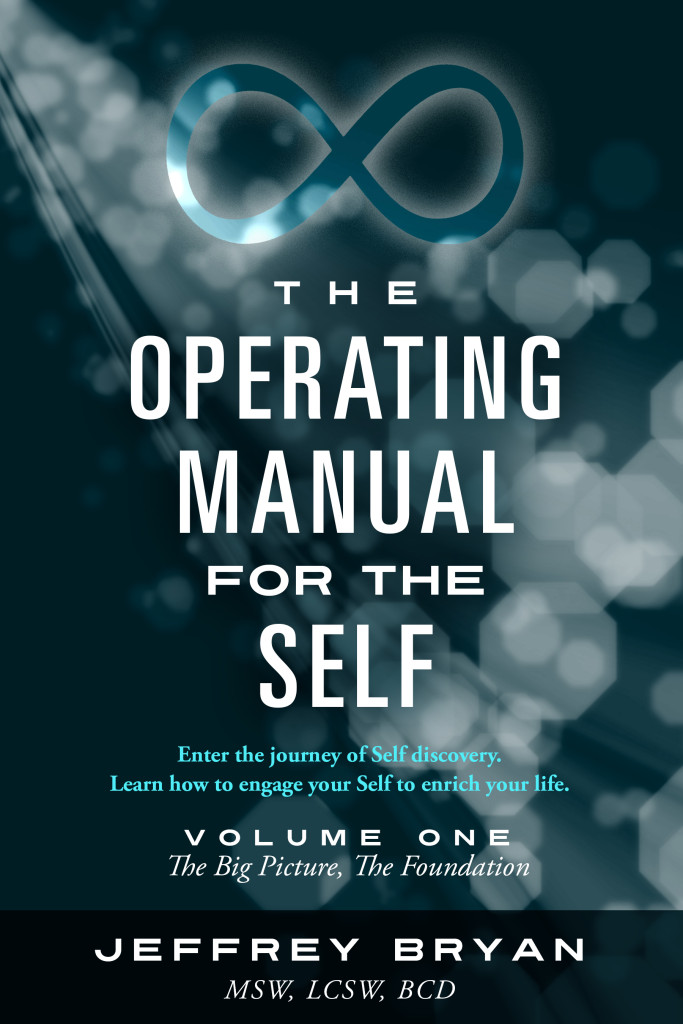Processing the Present Moment
INTRODUCTION
We said that the present moment has three phases creating, experiencing, and processing. We described creating the present moment in our February Letter[i] and experiencing in the March Letter[ii]. When experiencing, we called the present moment the now moment to emphasize the immediacy of this aspect of the present moment. Each now moment generates experiences which accumulate into the experiences of a lifetime.
Let’s turn our attention to processing the experience of the now moment. Much of this will sound familiar though there are some aspects of processing that you may be unfamiliar with. We are already doing what we will describe. As we have repeatedly said, our goal is to do what we do with more awareness.
In this and in the next two letters we begin to explore a complex topic.
Point of Empowerment: The complexity of processing the present moment points to the richness of the present moment, to the richness and complexity of our life.
You might say, “This is too much work. Why bother?” Since we are exploring what we already do, by doing it more consciously, with greater awareness, we can be, do, and have whatever we want in life. We can decrease the pain that we feel and increase the happiness, satisfaction, love, and joy that we want for ourselves. You don’t have to do everything described here. Doing some of it goes a long way.
DEFINITION OF PROCESSING
In processing we use our ability to think to work with the “objective data” of the now moment—our perceptions (what our five senses tell us) and our feelings. Processing the now moment consists of:
- Dealing with our feelings
- Interpreting our experience to create meaning and understanding
- Creating a memory of our experience
- Generating the desires that we want to have fulfilled in our future
- Deciding if we need to take some action as the result of our experience
Some aspects of processing are done almost instantly, others are done over time, and some are done both instantly and again at some point in the future when we reflect on an experience.
Point of Empowerment: Some aspect of processing are reactive to what we experience. Other aspects of processing involve making decisions and choices about what we want for the future. 
- Look at the expression on the face of that unhappy child. What did he experience in the now moment? What was he feeling?
- How did he process the present moment?
- How did he interpret this moment? Possibly, “My life is over. I will never get the attention I NEED and I will DIE.”
- What is the rest of his life going to be like? He will be constantly seeking the attention that he thinks he needed and never got as a child.
FEELINGS
After experiencing the feelings of the now moment we need to process them by:
- Becoming clear about what we are feeling
- Identifying the trigger for a feeling
- Understanding a feeling’s message
- Interpreting the information a feeling contains
- Deciding if there is something we need to do about what a feeling is telling us
Our feelings are so important because they serve important functions. They:
- Give us information about events that are happening in our life
- Tell us about what is important in our life
- Help guide us to the directions we want to go in
- Help us determine what we want for our future
- Alert us to our inner conflicts
- Help us discover what needs to be healed from the past
Our subconscious mind processes our feelings automatically, all the time. We process them consciously, with awareness, when we have painful experiences, especially painful experiences that keep repeating themselves. We do not want to keep repeating these experiences. Also, we consciously process our feelings when they are pleasurable, but not as often as processing the painful feelings.
Point of Empowerment: Processing pleasurable experiences give us the opportunity to repeat these experiences bringing more pleasure into our life.
As human beings we have the ability to identify what feelings we are experiencing. Putting this ability into practice is essentially allowing and relaxing. It’s allowing the part of our self that is capable of accomplishing this task (identifying what we are feeling) to do its job without “interference”—distorting or defending against the feeling.
Practice: Ask yourself, “What did I feel in the now moment that just passed?” Allow the answer to appear in your awareness by taking a deep breath, relaxing, and allowing the feeling to emerge.
Practice: After identifying what you are feeling, use the above processing and functions list to generate questions. For example ask, “What triggered this feelings of anxiety? What do I need to understand about why this situation triggered anxiety? What do I need to change in order to eliminate or reduce my anxiety?” Or, “I felt happy last night. What triggered feeling happy? What do I need to do to repeat this experience?” Or “I felt confused. Is there some inner conflict I am feeling about something? What is it? What do I have to do to resolve this conflict?”
Practice: Take the action you discovered.
INTERPRETING FOR MEANING
Interpreting is taking the raw perceptions and feelings of the now moment (our experience) and giving meaning and understanding to those experiences. By interpreting we have created or become aware of something that is not an obvious part of the experience.
Meaning
Meaning is a connector. It serves the purpose and function of creating connections among the various aspects of our life, especially experiences. It gives our life a sense of wholeness and “meaningfulness.” When we say that an experience is meaningful we are saying that an experience matters, is important, and is significant. We seek to have greater and deeper meaning to our life. Greater meaning takes us beyond our self, beyond our self boundaries. Deeper meaning brings us closer to the transcendent. We tend to automatically give every experience meaning. This is one thing we do as human beings. We don’t want an experience to be “meaningless.” Meaninglessness causes us to feel hollow and empty and can result in anxiety, depression, and despair. We want to have a “meaning full” life, a life that is important, matters, and has significance. A meaningful life is rich and rewarding. Meaning itself is meaningful as it help us feel connected, integrated, and whole. However, certain meanings that we create can be destructive.
Meaning takes the form of “this means that.” My wife’s kisses mean that she loves me. My success means that I can increase my self-confidence. The “dirty” look that my boss gave me means that he/she disapproves of me. Tripping as I walk means that I am clumsy. I asked for a date and was told no. This means that I am a “loser.” Each of these statements of meaning has an impact. Sometimes the meaning we give an experience is positive, sometimes negative, and occasionally it results in long lasting devastation. A prime example of long-lasting devastation is being “hurt by love” and deciding that love is too dangerous to pursue. We may then avoid love as much as we can. However since we need to love and be loved we seek love. Avoiding and seeking love gives rise to a painful ambivalence toward love, an ambivalence that all of us feel to one degree or another.
Point Of Empowerment: Caution, creating meaning can be hazardous to your health.
Practice: At the end of a day, identify some painful and some pleasurable experiences that felt significant. What meanings did you give to your experiences? If necessary, question these meanings and find new, uplifting, and empowering meanings.
Here are some examples.
- Seeking to improve my game of tennis is enjoyable but frustrating. Meaning: I love a challenge and need to learn to be better able to tolerate frustration. If I can do that I will enjoy the challenge more.
- I felt rejected, hurt, and frustrated when my spouse said no to sex. Meaning: I am an inadequate sex partner. However, feeling some hurt feelings and frustration is a natural consequence of hearing “no.” As I look back on my sexual history I see that I am truly not inadequate in this realm.
- My child was angry at me for something I said. Meaning: I am a bad parent. However, if I think about all the good that I do as a parent and understand that it is inevitable and natural that children are sometimes angry at their parents, I no longer think that I am a bad parent.
- I enjoyed my lunch with my friend. Meaning: I enjoy friendship in general and especially my friendship with this particular friend. I could do this more often and enjoy the pleasure of it.
- My friend and I laughed a lot during our visit. Meaning: laughter is thoroughly enjoyable. I should look for more opportunities to laugh.
Point of Empowerment: When we think about the meaning of pleasurable experiences we see how important pleasure is and that we want more pleasurable experiences..
Challenging old meanings and developing new ones is part of the work of personal growth. It is also the work of psychotherapy. Therapy can be very useful in helping us find and change subtle and deeply ingrained meanings that are causing us a lot of pain.
Next month we will continue our discussion of interpreting by exploring understanding.
CONCLUSION, NEXT MONTH’S DISCUSSION
We have begun our exploration of processing the present moment. We can see how important the processing is since it has a huge impact on our lives. Next month we will explore understanding, memory, desire, and taking action. The following month we will discuss the role of beliefs in processing the present moment and describe processing according to the challenge for your growth.
[i] February Letter https://iifsd.org/library/newsletters/february-2019-letter/
[ii] March Letter https://iifsd.org/library/newsletters/march-2019-letter/

